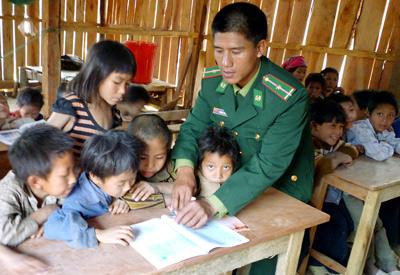Coordinate to promote anti-illiteracy in border and island areas
In order to consolidate the results of universal primary education and develop community learning centers in border and island areas in the 2011-2015 period, the Ministry of Education and Training has coordinated with the Border Guard Command to develop a Program to promote the fight against illiteracy.
The goal of this program is to fundamentally resolve the problem of illiteracy, re-illiteracy, dropouts, and school dropouts in border and island areas in order to maintain and consolidate the results of combating illiteracy and universalizing primary education.

Photo: Internet
Accordingly, the education sector and the border guards will combine teaching with popularizing and educating the law. In addition, they will coordinate to organize investigations, surveys, and objective assessments of the current situation of illiteracy, re-illiteracy, dropouts, absenteeism, the learning needs of people in the community, and the effectiveness of community learning centers in these two areas.
After the investigation, we will organize and mobilize people to go to school to maintain literacy classes, universalize primary education, and organize activities in community learning centers suitable to the actual conditions of border and island areas.
Organize training courses to improve professional skills and pedagogical skills for border guards and soldiers participating in the implementation of the Literacy Eradication Program, continuing education after literacy and regular education programs to meet the needs of learners, update knowledge, skills, transfer technology, etc.
According to the assessment of the Ministry of Education and Training, in recent years, the work of combating illiteracy and universalizing primary education in border areas has brought about positive social effects, contributing to improving people's knowledge, ensuring social security, raising national and border awareness for ethnic minorities, contributing to effectively implementing the Party and State's policies in border and island areas. However, the number of illiterate and re-illiterate people and the rate of students dropping out of school in these areas is still high. Thousands of remote villages and hamlets bordering the border do not have classrooms or have classrooms but they are made of bamboo and straw.
According to Dan Tri






